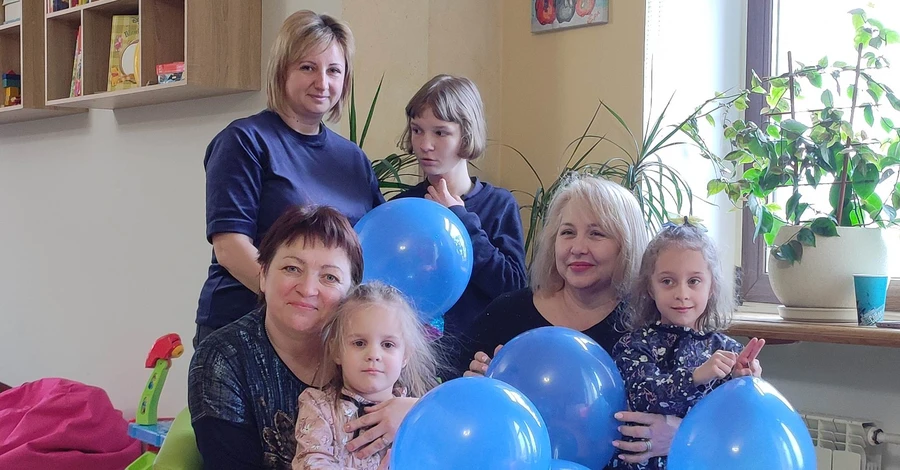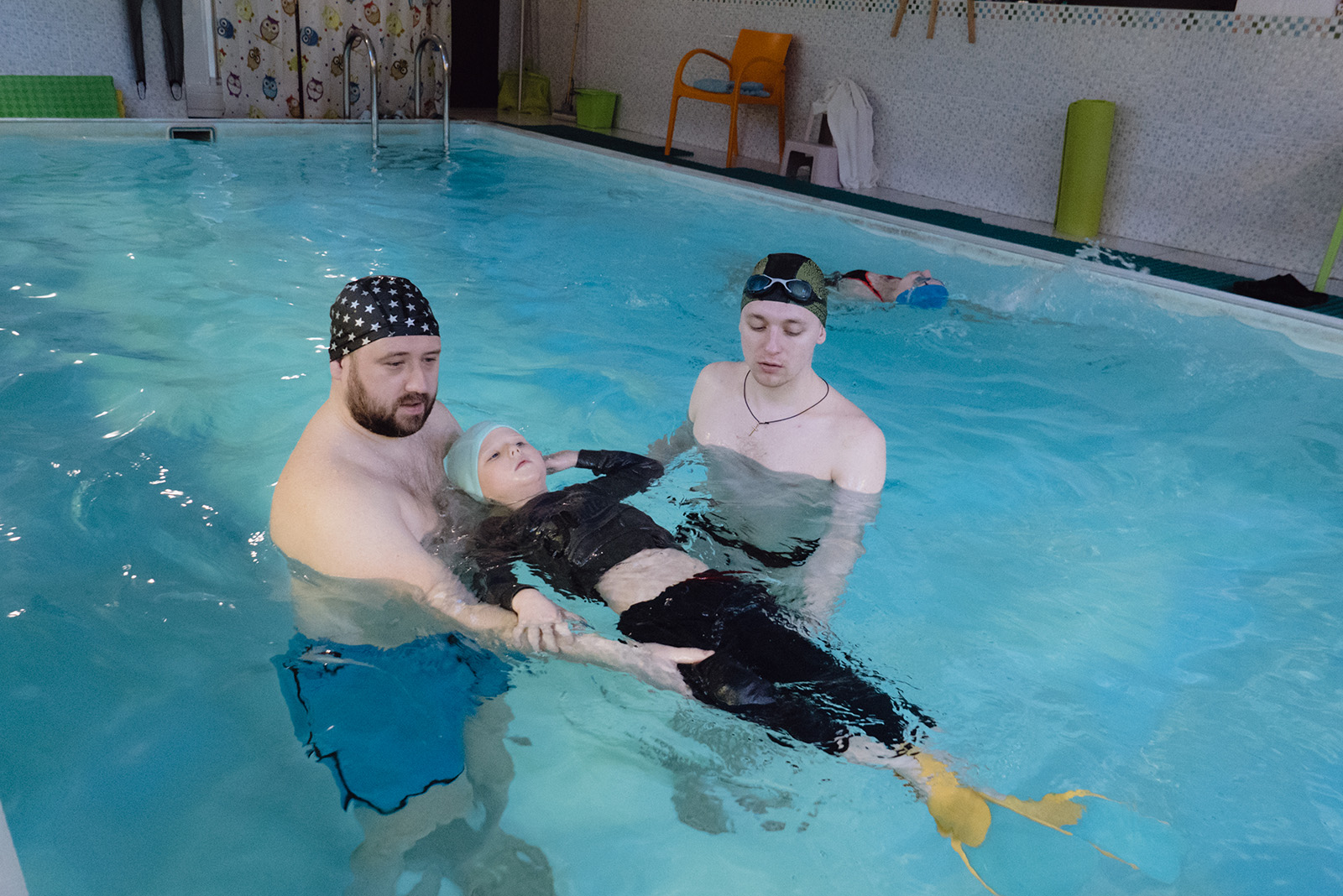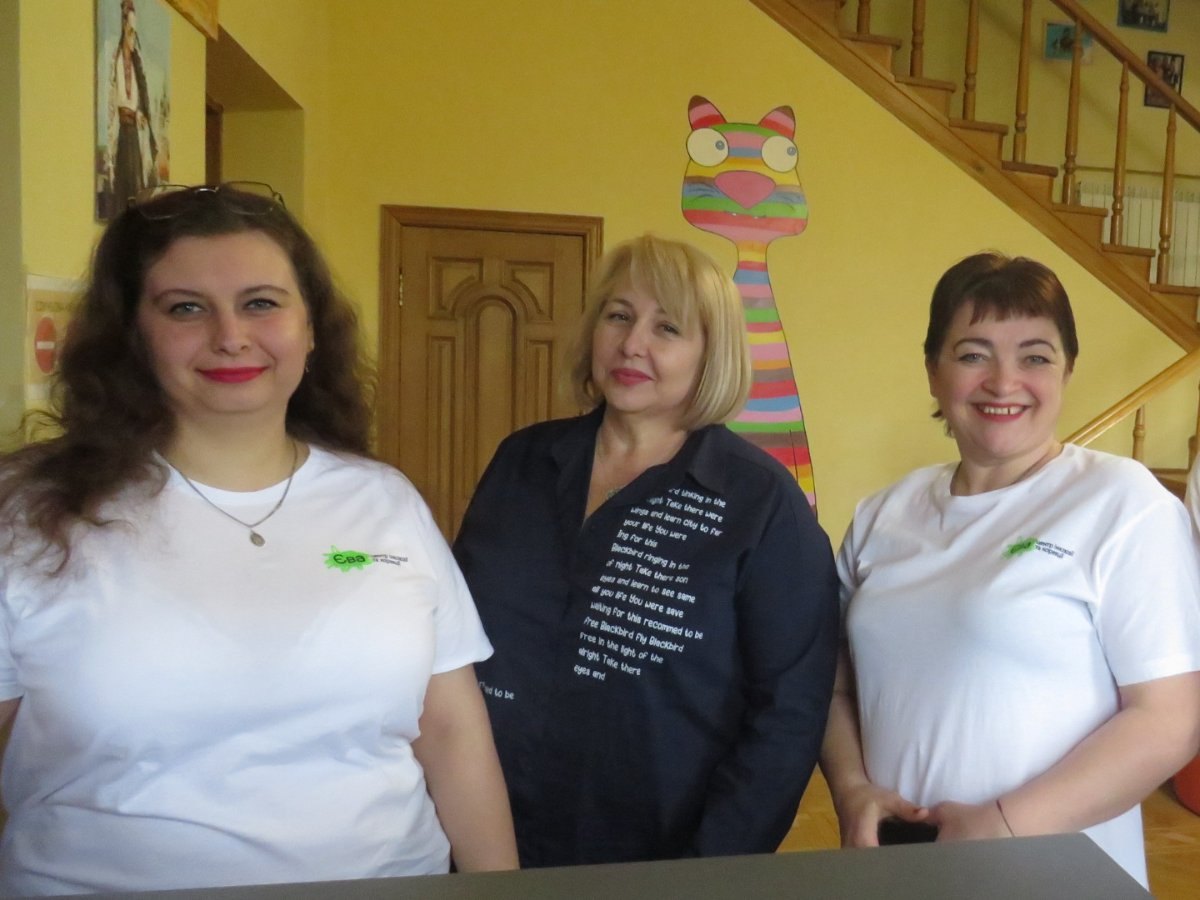"Eva" Rehabilitation Center: a place where children with severe diagnoses are helped
The war in Ukraine has shattered the lives and plans of thousands, especially the most vulnerable — children. It has particularly affected those who require daily assistance and whose medical records indicate severe diagnoses. But life goes on, and rehabilitation for children with special needs continues.

Son became a "vegetable"
The left side of Dima's body was paralyzed; he couldn't walk or speak. One day, while his mother and I were sitting together talking, Dima suddenly grabbed an object with his left hand. Our joy knew no bounds! — says Olga Kravchuk, president of the Charity organization "Direct Help Foundation." She is also the founder and director of the "Eva" Inclusion and Correction Center for children in Petropavlivska Borshchahivka, where even during the war, they help children with diagnoses such as cerebral palsy, autism, Down syndrome, Rett syndrome, Williams syndrome, nervous system disorders, dysarthria, alalia, developmental defects, heart defects, hearing and vision impairments, and musculoskeletal disorders.
This is a story about a little (big!) miracle and the feat of our people.
Six-year-old Dima Vynohradov, about whom Olha speaks so emotionally, underwent a brain cancer operation at the age of seven months.
"Dima was six months old when he suddenly cried out at night, then fainted and fell into a coma. He had shown signs of a cold the day before. A pediatrician came to us, prescribed medication, and gave it to our son before bedtime. At three in the morning, he began to have terrible seizures," says Dima's mother, Olha.
The ambulance took the child to the hospital, where an MRI showed a malignant brain tumor. The boy underwent surgery.
"The scar was all over his head. My son was like a “vegetable.” Until that pivotal night, he had developed like a normal baby — he tried to sit, babbled, and after the surgery, all of those skills disappeared. He didn't even cry, there were no tears. He just breathed heavily and didn't react to anything," Olha recalls.

Then came the long course of chemotherapy and endless trips to hospitals by the mother to find a solution — how to bring the little boy back to life. Doctors diplomatically suggested waiting, watching the dynamics, observing... Overall, no one dared to take on the rehabilitation of such a little baby.
Mother Olha decided to work with her son on her own: she opened YouTube and typed the necessary words in the search bar. One thought was beating in her head: "Who else will do this if not a mother?" Her only “assistant” was her older son — two-year-old Mykhailo. And they began to make progress! Slowly but surely, Dima began to move toward recovery.
Fortunately, the "Eva" center opened in Petropavlivska Borshchahivka, and Olha, grabbing her boys, rushed there. There they were offered a comprehensive rehabilitation program.
— Over the course of a year and a half, six-year-old Dima has learned to stand, walk, crawl, and eat on his own. He can hold a spoon and feed himself, which was something I couldn't even dream of six months ago. We are now working on his speech: Dima can pronounce sounds and use gestures to communicate his needs. But the most significant result has been his back. Before classes, due to the curvature of the spine, Dima had convulsions; he could lie and sit only on his right side. Thanks to swimming lessons, physical therapy, and the help of trainers and rehabilitation specialists, the boy's back has almost straightened out, and Dima began to walk. He is holding on to the wall, but he is walking! — says the mother.
And then, one day, Dima picked up an object with his left hand.
It was a real miracle. The personnel of the "Eva" center performed a feat. According to Olha Kravchuk, the most recent MRI of six-year-old Dima Vynohradov showed that he has an excellent chance of returning to a full life. Mom cries with joy:
— My son's baby teeth fell out. This is very good! This means that the body began to recover after the horror that we had to experience!
His shoulders straightened
Recently, the first group of 25 children who completed rehabilitation during the war graduated from the "Eva" center. Since its establishment in March 2021, the "Eva" center has provided free rehabilitation services to over 400 children. Professional speech therapists, psychologists, masseurs, and rehabilitation specialists work with the children here. The center's wards engage in therapeutic exercise, receive massages and neurocorrection, swim in the pool, work with a psychologist, draw, dance, and sing. And this is only a small part of what the extensive rehabilitation course includes.
All of this is free for them. The funding has been provided by the public organization "Techiia Foundation" of TECHIIA Holding and the charitable organization "Direct Help Foundation," which took care of all organizational issues. Fortunately, the center's building was not damaged during the hostilities in Kyiv.
In addition to rehabilitation for their primary illnesses, "Eva" offers children with special needs the opportunity for socialization. It's no secret that such children often lack communication with their peers, but healthy children are not always willing to be friends with those who are "different." This is a problem for our entire society and each of its members.
Here's 17-year-old Vlad, a ward of the "Eva" center. He has cerebral palsy, but his mental potential is intact, so Vlad attends an inclusive class in a regular school. But out of 30 classmates, there are no willing companions for someone like him. Vlad loves to read, but he has no one to talk to about what he's read. What should he do?
The people at "Eva" know this problem very well. They thought about it and decided to organize not only individual but also group sessions for teenagers so that they could develop new skills and communicate with each other.
Said and done. Vlad's mom is confident that it's simply a gift of fate:
— Before Vlad started going to the "Eva" center, he was constantly losing and forgetting something. And after group sessions and communication, he became more independent and responsible, commuted to classes, and returned home on his own. He learned how to swim and made friends.
Olha Kravchuk says that after the boy started communicating with peers, even his "shoulders straightened."
He felt like a part of society as if a new universe had opened up for him. He became collected, he has friends here, joint activities — and we see how positive socialization affects children with special needs, — notes the head of the "Eva" center.

Doctors refused to even give her a massage
Sofia is 20 years old. She is a second-year student at Ukraine University and wants to work in a travel agency and visit different countries. She has already been to Germany and Egypt and dreams of seeing the United States, Japan, and Korea.
After her classes, Sofia goes to the "Eva" center, where she undergoes a difficult recovery after an oncological operation. And then she plays “a travel agency” with other residents of "Eva," "selling" them tours anywhere. Psychologists are happy: socialization is going well, the children are satisfied, and the recovery is ahead of schedule.
But everything could have been different. When Sofia was seven, she suddenly began to complain to her parents about pains in her stomach, legs, and head and became scattered and apathetic. Therapists, orthopedists, and gastroenterologists could not find the cause of her condition until her parents finally took her to the Romodanov Neurosurgery Institute. There, a tumor was found on Sofia's brain, and an urgent operation was prescribed.
Fortunately, the tumor did not have time to grow into the brain, and the surgery was successful. However, such an intervention in a child's body rarely goes unnoticed: the girl stopped walking and speaking. This was the body's reaction to chemotherapy.
— It was very difficult for us, but the doctor said everything would be fine. He said that after the course of chemotherapy, we would start rehabilitation — and our daughter would gradually recover," Sofia's mother Iryna said. — The main thing was to avoid overloading the body and stimulating the tumor.
But there were still cancer cells in the girl's body, and no one dared to take her for rehabilitation. Stimulating circulating oncogenic cells would mean condemning the child to a relapse. Rehabilitation centers even refused to give the child a massage, allowing only swimming.
— We focused on just swimming for several years, and it helped a lot. Sofia soon started speaking, holding her head up, then she learned to walk with me supporting her under her arms, — recalls her mother.
At "Eva," the girl not only swims but also gradually engages in therapeutic exercises. She also communicates with a psychologist and other wards of different ages. They dance, sing, play, and draw. And they see only good things for themselves in the future.

"This was Eva's will"
The founders of the "Eva" center, Olha Kravchuk and Svitlana Yezhova, say that every positive result of the rehabilitation of their wards brings tears of happiness and a tiny bit of sadness too because Eva was the name of Svitlana's daughter, who passed away at the age of 17 from oncological disease.
— When Eva finished her first treatment, the question of rehabilitation arose. And it turned out that there were no children's rehabilitation centers after oncological diseases in Ukraine. We had already been thinking about opening such a center before that, but the situation with Eva finally pushed us to fulfill this plan. In the last days of her life, Eva asked her mother not to leave the children who are undergoing treatment for cancer alone. This was her last will, — said the leaders of the center.

One course of treatment at the "Eva" Center is designed for 25 children, which allows each child to receive individual sessions. The rehabilitation period is two months, but if a child needs more time, they can take a repeat course after six months.
— Of course, almost all parents would like to bring their children on a regular basis, especially since this is a charitable course — we want to help as many families as possible reduce their rehabilitation costs, — say Olha and Svitlana. — However, if three sessions are missed without a valid reason, we consider it a lack of interest on the parents' part in their child's rehabilitation, and we take a new ward from the waiting list. We have posted this list on our website and social media. Children and their guardians can add their information, coordinates, and rehabilitation card issued during the establishment of disability and apply for a rehabilitation course at "Eva."
Sessions at the center last for 45 minutes, plus 15-minute breaks. Children attend the center 2-3 times a week, but it all depends on how much workload the child can handle during therapy. Therefore, all individual children's characteristics are considered when creating the schedule.
Parents are actively involved in the rehabilitation process. "Eva" is considered a unique institution where children not only work with rehabilitation specialists but also with their parents. Moms and dads attend a guardians' school where they learn how to achieve the best rehabilitation results, which will have a positive impact on their children's health.

Advice for parents of special children
- Do not lose hope.
- Do not give up. It is not enough to just believe in your child, you must also constantly rehabilitate them.
- If you cannot find doctors willing to take on your child's rehabilitation, start doing it yourself. There are plenty of resources available on the internet. Educate yourself.
- You will always be short of money for rehabilitation. Look for opportunities. For example, the "Eva" center, which children have been attending for free for a year and a half, many parents found out about it from the internet.
- Do not stay at home crying over your troubles. Get out and socialize your child.
- Do everything in your power, even when those around you do not believe in you.
- Raising a child with a disability is a huge job and a load for parents. Therefore, take a break at the first opportunity when leaving your child with someone else.
FROM THE FIRST SOURCE
"Many programs and philanthropists are concerned about the treatment of children with cancer and provide surgery departments with better equipment and expensive materials. There are fewer rehabilitation projects. That is why we are thrilled to see how the symbiosis of “Eva,” specialized professionals, and us as the business, helps young Ukrainians to recover," says Oleg Krot, Director of the "Techiia Foundation" and Managing Partner of the TECHIIA holding.
Source: KP.UA


